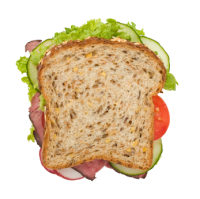Sometimes people using a VLCD meal replacement product can experience short term constipation.
As such, during the Healthy Weight For Life™ program it is important to:
- Take preventative steps to reduce the risk of developing constipation
- Be aware of your normal bowel habits and act early if you notice you are needing to open your bowels less than usual.
- If you become constipated don’t ignore it, take action as soon possible
- Speak to your doctor or pharmacist if symptoms persist, if faeces are bloodstained or black and tar-like, if you have other symptoms such as a headache, fever or pain.
Symptoms of constipation can include:
- Passing faeces less often than usual
- Hard, dry, lumpy stools that may be painful to pass
- Straining or discomfort when trying to pass a bowel motion
- Having to sit on the toilet for much longer than usual
- Sensation that the bowel hasn’t fully emptied
- Discomfort or pain in the lower back or stomach
- Bloated abdomen and / or abdominal cramps

Causes
Constipation can be caused by many different factors.
Common causes of constipation include a change in diet, change in daily routine, not enough fibre in the daily diet, not enough fluids and lack of exercise.
Other factors that can cause or exacerbate constipation include:
- Some medicines and supplements, for example:
- iron and calcium supplements
- calcium-channel blocking antihypertensives (eg. verapamil – brand names include: Isoptin™ and Cordilox™)
- pain relievers (particularly those containing codeine)
- antidepressants
- Delaying bowel opening
- Pregnancy
- Hormone changes around the start of a woman’s menstrual period
- Increasing age
- Stress
- Some medical conditions
Prevention
Increase the amount of fibre in the daily diet.
Good sources of fibre include wholegrain cereals, fruits, vegetables and legumes.
The ‘free food’ recipes in the Healthy Weight For Life – Week by Week Guide are a great way to boost daily fibre intake with great tasting soups, salads and snacks.
Fibre supplements may be helpful for some people to boost daily fibre and may be a good preventative option for individuals prone to constipation. Most fibre supplements need to be taken with plenty of water.

Drink plenty of water
(and limit intake of diuretic drinks such as tea, coffee and alcohol)
Water makes up about three quarters of faecal content. Drinking adequate water can help plump out faeces, and makes taking fibre supplements more effective.

Be as active as possible
Regular exercise can improve bowel motility. Every little bit of regular exercise helps.
Minimise constipating medicines and supplements
Talk to your doctor and pharmacist about the medication and supplements that you are taking. There may be alternative options available for you that are less likely to contribute to constipation.
Toileting technique
Sitting position on the toilet can affect bowel function. It is best to lean forward with a straight back, and with feet flat on the floor or on a foot-stool, so that knees are above the hips.
Interventions
For mild constipation or decreased frequency, simply increasing dietary fibre and water can often be adequate to restore normal bowel motions.
Laxatives - There are several different types of laxatives available eg. bulk forming fibre supplements, osmotic laxatives, stimulant laxatives and stool softeners. Different laxatives have different actions in the bowel and also differ in how quickly they work.
The choice of a laxative product depends on how severe the constipation is, the cause of the constipation and the age of the constipated person. Laxatives can be purchased from a pharmacy without a doctor’s prescription however you should ask your pharmacist or doctor for their advice on the most appropriate product for you.
Bulk forming fibre supplements
Increase the bulk and water in the stool, so the faeces pass though the bowel more quickly and easily. Most fibre supplements need to be taken with plenty of water. Fibre supplements include:
• psyllium (eg. Metamucil™)
• inulin (eg. Benefibre™)
• ispaghula (eg. Fybogel™)
Osmotic laxatives
Increase the amount of fluid in the bowel. This makes the faeces bigger and softer and helps it pass though the bowel more quickly and easily. Osmotic laxatives include:
• macrogol (eg. Osmolax™, Movicol™)
• lactulose (eg. Actilax™)
• sorbitol (eg. Sorbilax™)
• glycerol (eg.Glycerin suppositories)
Stimulant laxatives
Increase the activity of bowel muscles and helps pass faeces though the bowel. Stimulant laxatives include:
• bisacodyl (eg. Dulcolax™)
• senna (eg. Senokot™)
• frangula (eg. Normacol™)
Stool softeners
Soften faeces making it easier to pass. They are very mild laxatives. Stool softeners include:
• docusate (eg. Coloxyl™ - also combined with senna to stimulate the bowel)
• liquid paraffin (eg. Agarol™)
Please note
This information is general in nature and does not replace the advice of your healthcare professional.
Remember - speak to your doctor or pharmacist if symptoms persist, if faeces are bloodstained or black and tar-like, if you have other symptoms such as a headache, fever or pain.
Flatulence
For some individuals the change in soluble fibre in their diet may result in flatulence, loose and/or more frequent stools in the first few days. The body usually becomes quickly accustomed to this change in fibre.
If excess flatulence becomes an issue you may like to speak to your local pharmacy about using activated charcoal for a few days to absorb the excess carbon dioxide being produced.
Lactose Intolerance
The protein used in the manufacture of KicStart™ is primarily dairy based therefore the shakes and soups do contain naturally occurring lactose. Lactose is a natural sugar found in milk and other dairy products. Lactose intolerance is the body's inability to properly breakdown or digest the amount of lactose that is consumed.
Lactose intolerance symptoms may include loose stools, bloating or cramping.
Lactase is a naturally occurring enzyme in the small intestine that is needed to breakdown lactose (dairy sugar) in the intestines.
The amount of the lactase enzyme in the gut varies between individuals therefore certain people can tolerate more lactose from dairy products in their diet than others. The amount of the lactase enzyme a person produces can also diminish as they get older.
When the amount of lactose an individual consumes exceeds the amount that their lactase enzymes can efficiently breakdown then symptoms of intolerance can occur.
The severity of symptoms can vary depending on the amount of lactase enzymes present and the amount of lactose consumed.
Those who have mild lactose intolerance or sensitivity may be able to utilise a lactase supplement (such as Lacteeze™ tablets) to help their body breakdown lactose more effectively and reduce the symptoms of lactose intolerance - please discuss the available options with your local pharmacist.
Alternatively, reducing the total amount of lactose consumed (eg. in Phase 1 using 1 KicStart™ shake or soup per day rather than 2) will help alleviate symptoms.
